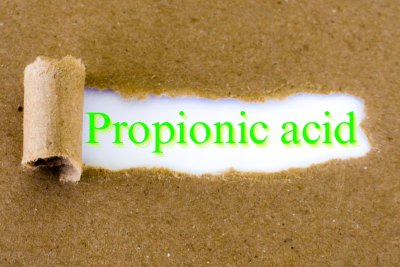Fermented wheat flour = stealth additive?
Some manufacturers are replacing calcium propionate with a ‘clean label’ preservative.

The Real Bread Campaign works towards everyone having a realistic chance to choose Real Bread, for whatever reason(s) they need or want to. Amongst the elements essential to people having the chance to make better-informed food choices are truthful and honest labelling and marketing.
We believe that companies deploying 'clean label' practices (such as choosing not to declare when the innocuous-sounding 'fermented flour' is a cover story for adding propionic acid, commonly used as a preservative) is dishonest and misleading - particularly if they also make a 'no preservatives' type claim on the pack.
Does ‘clean label’ mean ‘clean’ product?
Questions and concerns about ultra-processed food (UPF) are increasing, with many people expressing a preference for food that is unprocessed or, at least, less processed. Ingredients lists help towards this, supporting everyone’s right to know what goes into food and the choice of avoiding additives…or do they?
Since the Campaign began in 2008, we have been highlighting what we see as a legal loophole, which permits manufacturers to leave additives-by-another-name off ingredients lists. If a substance is deemed to be a ‘processing aid’, *shazam* a company can choose to act as if it was never there, even if it leaves behind residues or by-products. To be clear, the law doesn’t prevent a manufacturer declaring a ‘processing aid’ on the ingredients list, the legislation simply doesn’t require them to do so.1
Another ruse is what additive pushers (sorry, ingredient suppliers) and Big Food corporations seem to delight in referring to in trade press, as ‘clean label solutions’. These tend to have names that are likely to be perceived as sounding more natural and familiar, or less off-putting, than (for example) mono and diacetyl tartaric acid esters of mono and diglycerides of fatty acids (aka the emulsifier E472e).
Confession time
It turns out that one of these ‘label friendly solutions’ is fermented flour, also known as cultured flour. Despite running the Real Bread Campaign for more than 16 years, I have to admit that I was caught out by this. I had rather naively assumed this term always meant flour that had been fermented using lactic acid bacteria. I basically thought it was always a lab / factory produced sourdough starter culture, used live or denatured (killed) and sold as a powder to be used as a flavour enhancer for doughs left wanting by shortened fermentation times.
It turns out that what it can mean instead is flour fermented using bacteria (such as Propionibacterium freudenreichii) to generate propionic acid. This has antimicrobial properties similar to its salt, calcium propionate (E282), an additive widely used as an artificial preservative by industrial dough fabricators.2 Both are used to extend what companies call ‘durability’ (and the rest of us call shelf life), prolonging the time their products remain saleable.
By inhibiting mould growth, such preservatives might also help to reduce domestic food waste, though UK homes binning something like 24 million factory loaf slices every day must be factored into any analysis of how well that’s working out.
What’s the problem?
If a manufacturer uses a bacterial culture to generate propionic acid, then removes the growth medium (a mixture of water and flour, for example) to purify it, the propionic acid must be listed on a product label by name and / or the code E280.
If flour and water is used as a growth medium but the manufacturer doesn’t remove it, the user that adds it to a product can choose to list the mixture as 'fermented wheat four' without naming the propionic acid or stating that it is a preservative. While legal, we believe a company choosing to do this is only telling a partial truth and is misleading people by omission of an important, material fact, compounded when that company makes a ‘no preservatives’ promise.3 We say that this information should be declared for whatever reason people want or need it. Doing so will have no impact on people who don’t want or need it.
The Campaign is not in the business of scaremongering. Propionic acid naturally occurs in small quantities across a range of foods, including some sourdough starters. Eating an industrial wrap, sandwich, bagel or whatever, which has been covertly laced with added propionic acid in higher quantities, is not going to kill you.
In its purified form, propionic acid is an additive approved for food use in the UK, EU, USA and many other territories. While there are studies that have questioned its possible negative effect on the gut microbiome, the possibility of it triggering an intolerance or allergic response in some people, and its safety more generally, other studies have suggested potential health benefits.
As we often point out: additives, while functional, are unnecessary and history is littered with those that governments and Big Food once assured us were safe, which were then banned or withdrawn on health grounds. More research is needed.
But what about…
In anticipation of any whataboutery, why do we challenge companies not naming the propionic acid in this type of 'fermented wheat flour' but have no issue with the products generated by a starter culture going undeclared? This is a matter of purpose and intent. The lactic and acetic acids generated by a sourdough starter culture are intrinsic and fundamental to making genuine sourdough bread. Without them, there is no sourdough bread. There is no intention by bakers or retailers to leave or lead anyone to believe otherwise.
By contrast, propionic acid is not essential for making bread or any other baked goods. Without it, you still have bread. While the description ‘fermented flour’ is factually accurate to a point, it is not the whole truth. Nobody expects propionic acid to be added to their daily bread and I'd put money on a survey of shoppers finding the majority surprised to learn that a manufacturer had. I think the industry terms ‘clean label’ and 'label friendly' are clear indications of intent, which doesn’t smell like honesty and transparency to me.
'No labels say that vinegar contains acetic / ethanoic acid, which in its purified form has the code E260! Both it and salt are preservatives!' Correct. Salt is clearly named on ingredients lists and acetic acid is an intrinsic component of all vinegar - again, there is no intention to leave or lead anyone to believe otherwise.
Choice
The Real Bread Campaign has never told anyone what they should or shouldn’t eat; or sought to ban any additive, the Chorleywood Process or other means of manufacture. Instead, we enthusiastically encourage people to choose Real Bread, whether made at home by hand or machine; from a public sector menu; or bought, preferably from a local, independent bakery. Many people choose otherwise and we support their right to do so.
We also work towards a future of Real Bread For All, in which everyone has a realistic chance to choose it. Major manufacturers and supermarkets have the ability to make Real Bread available and accessible more widely but generally choose not to. Due to a range of factors, including economy of scale and the ability to more than make up profit margins elsewhere in a shopping basket, retailers could offer Real Bread at a very low price but, again, they generally choose not to. The issue I’m raising in this particular post, however, is transparent and honest labelling and marketing, rather than urging companies to change their prices or what they manufacture and sell.
Going back to the start of this post, choice is fundamental to our ethos and work, with our ideal being people able to make better-informed choices. Can the same be said of manufacturers that add this type of ‘fermented flour’ but choose not to name the propionic acid it has been intentionally cultured to contain - especially those that then make a 'no preservatives' claim?
Propionic probing
Have you spotted bread (or industrial dough product) with fermented flour on the ingredients list?
We’d love you to take a photo of the pack front and ingredients list then either email the manufacturer, or contact them on social media, to ask if they are using 'fermented flour' cultured to contain propionic acid. Please let us know what response you get.
1 Conversely, the law doesn’t require Big Bakers, supermarkets etc. to use any marketing claims, but they seem more and willing and able to make plenty…
2 Please don’t refer to it as a ‘bread additive’. Additives are not used in making bread, they’re used in manufacturing industrial dough products.
3 To be clear, we are not stating or implying that any company is breaching any regulatory requirement or restriction on the listing of ingredients, additives or processing aids. The law allows companies to list 'fermented wheat flour' without mentioning propionic acid. We would, however, question a company making a 'no preservatives' claim if the fermented wheat flour had been added mainly, or partly for the purpose of inhibiting microbial activity or otherwise extending the shelf life of a product.
Updates
...will appear at the end of this news item.
Published Tuesday 22 July 2025
Real Bread Campaign: Finding and sharing ways to make bread better for us, our communities and planet.







